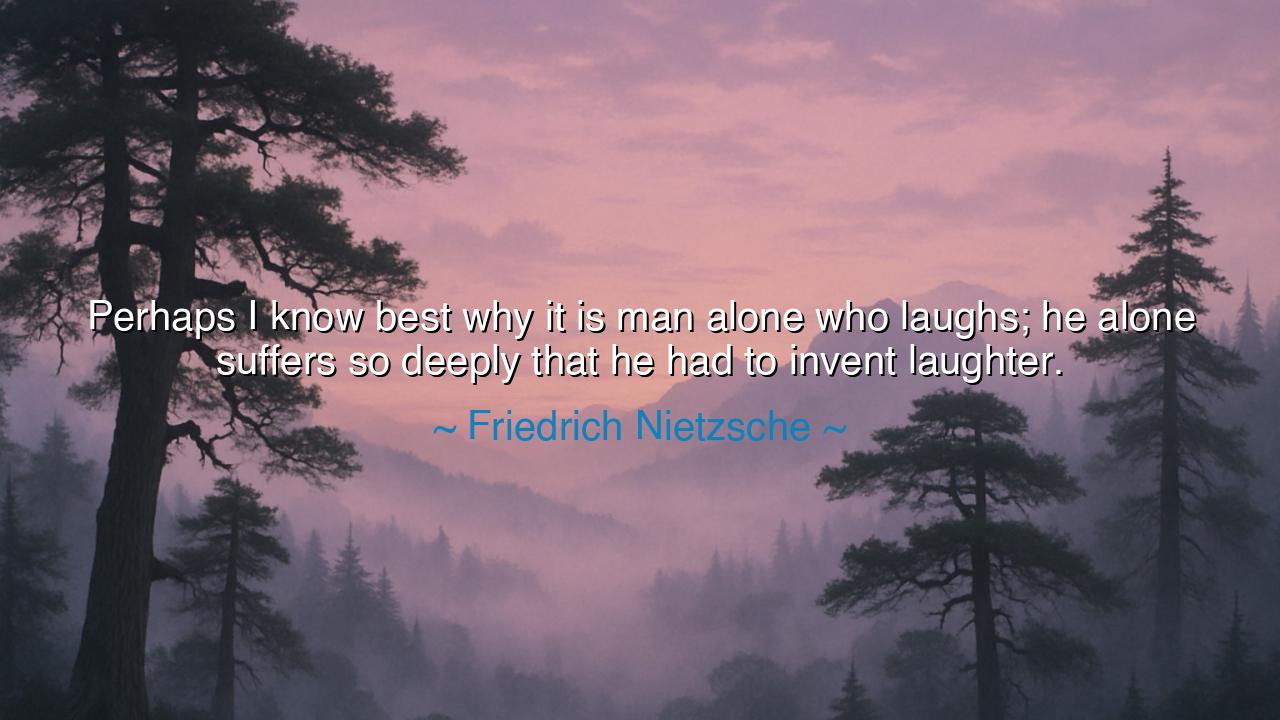
Perhaps I know best why it is man alone who laughs; he alone
Perhaps I know best why it is man alone who laughs; he alone suffers so deeply that he had to invent laughter.






When Friedrich Nietzsche wrote, “Perhaps I know best why it is man alone who laughs; he alone suffers so deeply that he had to invent laughter,” he was not jesting. He was speaking of something ancient and terrible — the mystery of human suffering, and the strange, divine power we have to transform it. To Nietzsche, laughter was not mere amusement; it was a weapon of the soul, a defiance of despair. It was the light that man forged in the darkest caves of his being, a spark struck from the anvil of pain. Only those who have suffered deeply, he said, can laugh truly — for laughter is not born from ignorance, but from understanding.
Nietzsche’s insight came from his own life, a life scarred by loneliness and illness. He walked apart from the world — misunderstood, exiled, and broken in body — yet within his solitude he discovered the strange alchemy by which suffering can become strength. His laughter was not the laughter of the shallow or the content; it was the laughter of one who had looked into the abyss and chosen not to fall. It was the laughter of the overcomer, the man who finds meaning even when the world denies it. This, Nietzsche believed, was what separated mankind from the beasts: not reason, not language, but the ability to suffer — and yet to smile.
In this way, Nietzsche’s words echo the wisdom of the ancients. The Greek tragedians, too, understood that joy and sorrow are twin-born. Euripides wrote that “whom the gods love most, they test most harshly,” for suffering deepens the soul’s capacity for greatness. And from that suffering comes the bittersweet humor that only mortals can know. The gods, immortal and unchanging, never laugh as man does, for they do not bleed. Their laughter is light and distant; ours is forged in fire. When man laughs, he defies the gods. He declares, “I am wounded, but I live!” That is the secret at the heart of Nietzsche’s thought — laughter as rebellion, laughter as resurrection.
Consider the story of Viktor Frankl, the Jewish psychiatrist imprisoned in the Nazi death camps. Surrounded by death, stripped of freedom, starving and humiliated, he observed that even in the most despairing conditions, man could still choose his response. Frankl wrote that those who retained the ability to smile, to find a moment of humor even in the horror, were often the ones who survived. Their laughter was not denial — it was courage, the soul’s cry that no darkness could fully conquer it. Here, in the furnace of human suffering, Nietzsche’s truth revealed itself: only the one who suffers learns the sacred power of laughter.
Laughter, then, is not weakness but strength. It is the spirit’s way of saying to the universe, “You cannot break me.” To laugh in joy is human; to laugh in pain is divine. When the world crushes you and you rise laughing, you become greater than your suffering. The ancients called this spirit ataraxia — the unshakable calm that comes from mastering the self. Nietzsche, though he spoke in modern words, sought that same mastery. He wished for humanity to become the Übermensch, the higher being who creates meaning in a meaningless world — and laughter was one of his tools. For what is laughter if not creation born from chaos, order born from sorrow?
But there is also tenderness in Nietzsche’s insight. When he says “man alone suffers so deeply,” he does not glorify pain; he acknowledges the fragility of the human heart. To live is to be aware — to love and to lose, to hope and to despair. In this awareness lies both our curse and our glory. Beasts do not laugh because they do not know their own mortality. Man laughs because he knows he will die — and still chooses to celebrate life. Our laughter is the echo of wisdom that says: even in the midst of suffering, there is beauty; even in the presence of death, there is meaning.
So, my children, learn this: laughter is sacred. Do not laugh only when life is kind; learn to laugh when the storms rage and the night is long. When you stumble, when the heart breaks, when hope seems lost — laugh, not in mockery, but in triumph. For to laugh in such moments is to proclaim your victory over despair. It is to say, as Nietzsche did, “I suffer, therefore I am alive.”
And when you laugh thus, your laughter will no longer be shallow or fleeting. It will be the laughter of the wise, the laughter that rings through eternity — the laughter that redeems pain and transforms suffering into strength. For in that laughter, born from the depths of anguish, you will find what Nietzsche called the greatest act of all: to say “Yes” to life, even when it breaks your heart.






AAdministratorAdministrator
Welcome, honored guests. Please leave a comment, we will respond soon